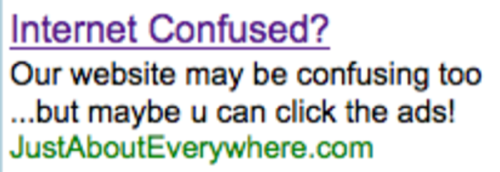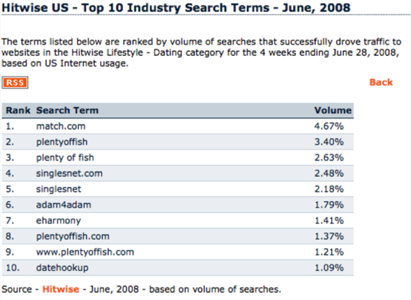Traffic analytics company Hitwise released search market share numbers for dating websites in June today and two things were striking about the data.

Ad supported free site PlentyOfFish is trouncing everyone in the dating game and huge numbers of mainstream users are still afraid to navigate there directly using their browser’s address bar. The economics of user ignorance are serious and could have big implications for online innovation. Update: Check out the great discussion on this in the comments below – we may have been convinced that this isn’t such a bad thing after all.
More than 10% of the searches for the top 10 dating search terms were URLs (match.com, plentyoffish.com) and almost all of the queries were something that .com could have been added to for direct navigation. If mainstream users learned to navigate using the address bar instead of the search bar – what would happen to the search economy and innovation online?

What is Wrong With People?
How many times have you seen someone enter a URL in the wrong field of their browser? Apparently it happens a whole lot, over and over again, all day long, all around the world.
Those users end up being shown links other than the place they want to go, including sponsored ads, competing sites and related sites sometimes with confusing URLs. Many of the top dating sites are buying AdWords links to their own sites in searches for their own URLs. How much are the search engines making from user click throughs of Match.com AdWords when users search for Match.com, even though Match.com is the top natural search result as well?
Oddly, no one appears to have bought ads for the search term plentyoffish.com on Google, though Hitwise seems to suggest that would be a good idea. We won’t claim to understand AdWords enough to explain why there aren’t ads there now – perhaps a reader can do so.
Web 2.0? Uh…
While we’re all excited about the Read-Write Web, filled with empowered user contributors and thrilling new web applications – a huge number of people online don’t know the difference between their browser’s address bar and search bar. Let’s keep that in perspective.
What will it take for them to learn? Do the browser providers and search engines want them to? They’ve got a clear financial stake in that not happening.
In fact, countless parties online probably do. If mainstream users learned how to use the internet, it could be devastating for an online economy based on monetizing their ignorance. Everyone knows that’s true for spammers and phishers, but the numbers indicate that there are a whole lot more people than that who are dependent on user ignorance. Luckily for them, there’s plenty of it to go around.
If more savvy users are less likely to click on ads, what does that mean for website usability and user education? Will an explosive future of smart users creating content online and using the web’s powerful features be limited by the financial interests of the companies providing online services? We think that’s probably already happening and it’s a real shame.
Update: Reader John Andrews articulates beautifully another perspective.
Don’t underestimate the user.
When she searches Amazon.com and gets something else in the top 2-3, she wants to know what that something else is, and why it ranks for her Amazon search. Perhaps there is something better than Amazon.com that other people know about, and she wants to know about that, too.
Even if the top 5 are amazon.com URLs, she may scan them to see what Google is suggesting is hot at Amazon.com, along the way to whatever she was after. Maybe there is something cool at Amazon she doesn’t yet know about, and she wants to know about that,too.
The path to Amazon.com via Google is a richer experience for her than the direct navigation path, without much cognitive overhead and without much perceived risk.
If the search engine earns a reputation for abusing the results set (with ads or paid placement) she will go away. Don’t underestimate the power of Google’s “Ph.D.” reputation amongst her and her regular-folk peers. They have ben granted tremendous authority.

















